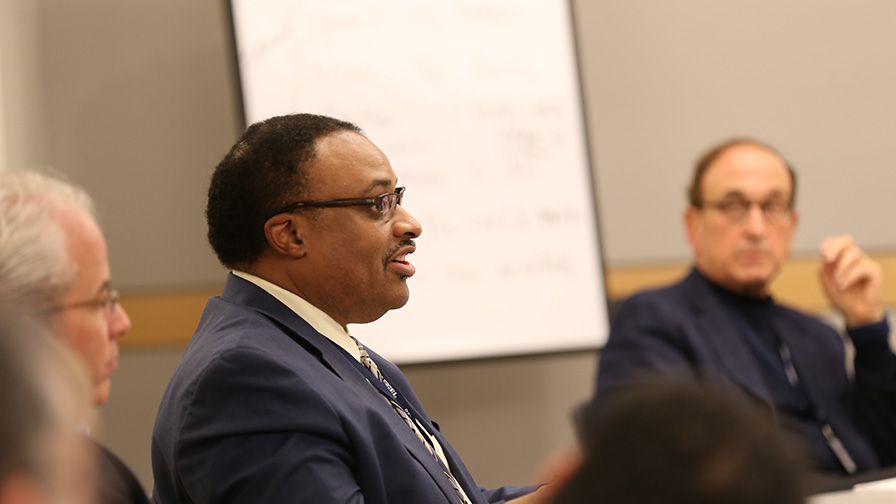
Batten’s Innovators’ Roundtable Explores Role of Big Data Reshaping Industries
By Gosia Glinska
The University of Virginia Darden School of Business Batten Institute for Entrepreneurship and Innovation hosted its eighth Innovators’ Roundtable in Washington, D.C., on 7 April at the U. S. Institute of Peace, located on Constitution Avenue near the National Mall. For the first time in its six-year history, the Roundtable convened in Washington, D.C.
The roundtable brought together senior leaders from 3M, Abundant Power, Capital One, Celgene, Corning, Danaher, Eastman Chemical, IBM, Recast Energy, Siemens and Smithfield as one of a series of informal daylong conversations to examine challenges and best practices in corporate innovation.
The conversation focused on the recent explosion of digital data and analytics, and its effect on the innovation process.
Led by Darden Professors Raj Venkatesan, Yael Grushka-Cockayne, and Ed Hess, the executives talked about how their organizations leverage the vast quantities of unstructured data — often called “big data” — to create value for customers and, in the process, unlock new ways to grow their businesses. They examined how data and analytics can help them make faster decisions; lower costs; predict and better meet customer needs; and create innovative products, services and business models. They also discussed challenges their organizations and industries face as they become increasingly data-driven.
Several takeaways emerged from the daylong discussion:
- Participants agreed that, while it is easy to get caught up in the hype surrounding the unprecedented volume of never-before-examined data, it is important to remember that data is most effective when it’s tied to the company purpose and aligned with its strategy.
- Digitization of data enables companies to innovate not only their products and services, but also their business models. Moreover, data analytics, especially predictive analytics, can make customer-centric marketing more effective by offering customers exactly what they want at the right time.
- Companies trying to leverage data and analytics to drive innovation should be able to quickly respond to data-driven insights. Therefore, leaders in large firms need to work hard to build an entrepreneurial culture that fosters agility and innovation.
- Digital data is reshaping businesses and industries, changing the ways companies create and capture value. To compete in a data-driven economy, business leaders must become savvier about where data fits into their businesses. They must learn how to convert the torrent of data flowing from every part of the global economy into actionable insights.
The University of Virginia Darden School of Business prepares responsible global leaders through unparalleled transformational learning experiences. Darden’s graduate degree programs (MBA, MSBA and Ph.D.) and Executive Education & Lifelong Learning programs offered by the Darden School Foundation set the stage for a lifetime of career advancement and impact. Darden’s top-ranked faculty, renowned for teaching excellence, inspires and shapes modern business leadership worldwide through research, thought leadership and business publishing. Darden has Grounds in Charlottesville, Virginia, and the Washington, D.C., area and a global community that includes 18,000 alumni in 90 countries. Darden was established in 1955 at the University of Virginia, a top public university founded by Thomas Jefferson in 1819 in Charlottesville, Virginia.
Press Contact
Molly Mitchell
Senior Associate Director, Editorial and Media Relations
Darden School of Business
University of Virginia
MitchellM@darden.virginia.edu




